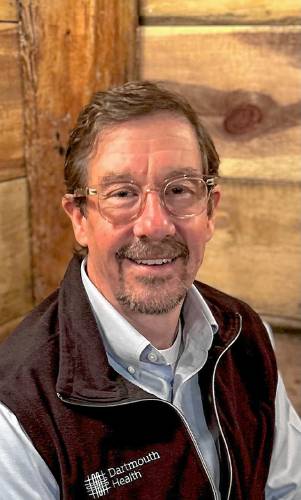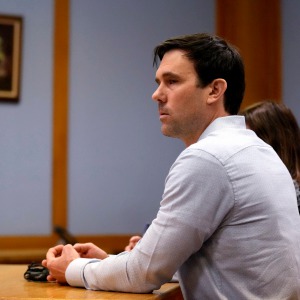West Central Behavioral Health interim CEO discusses workforce challenges

Alexander J. “AJ” Horvath is the interim CEO of West Central Behavioral Health. (Courtesy photo) Courtesy photograph
| Published: 02-01-2024 3:11 PM |
LEBANON — His title may be preceded by interim but with the pressing challenges of increasing demand for mental health services and the struggle to hire new staff, Alexander J. “AJ” Horvath is being proactive as he guides West Central Behavioral Health during its search for a new CEO.
“Some of what we want to do is improve access,” said Horvath, who assumed the interim role of president and CEO in October. “We have a lot of innovative ways to do that. We are working diligently to be competitive in the labor market to find good talent and are looking to partner with other similar organizations in our communities of Lebanon, Claremont and Newport.
“So really it is about partnerships, creating better access and really getting the best talent we can,” Horvath said.
Horvath, of Enfield, brings a leadership background to his position that has included the interim title, outside of health care, as part of his consulting business. He also comes on board with a familiarity with West Central, having worked there in an information technology role for a couple of years in the mid 1990s. Horvath, 55, replaces Roger Osmun, who left the position in October.
With a degree in business operations, Horvath has worked as a CFO and director of operations at Clara Martin Center, the mental health center serving Vermont’s Orange County and had been in administration at Dartmouth Health since 2010, before being hired to lead West Central. Horvath will remain in the interim position until a new CEO is hired, which could be six to 12 months or longer. He is not a candidate for the permanent position.
“When you come in in an interim role, the job is different but similar in a lot of ways,” Horvath said.
“The challenges are continuing to move the organization forward in a positive direction while also leading it through a time of change and uncertainty because a new leader is coming in,” Horvath said. “There is a certain level of management of those things simultaneously that are challenging in an interim role.”
West Central has a staff of 140 and offers a variety of mental health services for all populations. Its biggest hiring need is for clinical providers.
Article continues after...
Yesterday's Most Read Articles
 Herd departs Hartford’s last remaining dairy farm
Herd departs Hartford’s last remaining dairy farm
 Kenyon: What makes Dartmouth different?
Kenyon: What makes Dartmouth different?
 At Dartmouth, hundreds protest ongoing war in Gaza and express support for academic freedom
At Dartmouth, hundreds protest ongoing war in Gaza and express support for academic freedom
 Editorial: Parker parole a reminder of how violence reshapes our lives
Editorial: Parker parole a reminder of how violence reshapes our lives
 A Life: Richard Fabrizio ‘was not getting rich but was doing something that made him happy’
A Life: Richard Fabrizio ‘was not getting rich but was doing something that made him happy’
The mental health field has seen a strong increase in demand brought about in part by the COVID-19 pandemic, combined with workforce challenges seen just about everywhere in the Upper Valley, Horvath said.
“I think mental health is particularly challenged in attracting a workforce for a few reasons,” Horvath said. “The community of mental health is working with our most disadvantaged population. Our clients are wonderful people and they have struggles most of us don’t have.”
There is a lot of competition for different types of mental health jobs including schools, private practices and at Dartmouth Health, where pay and benefits are usually better, Horvath said.
“It is a combination of workforce challenges, supply of people and competition in the field,” Horvath said.
Other factors preventing the mental health field from attracting new workers to meet more demand are higher costs and stagnant reimbursements.
“Where health care really struggles, whether it is community mental health or a hospital, is our costs continue to go up with demand for labor and inflation impacting other costs but our fees for reimbursement do not increase at the same rate,” Horvath said. “What happens then is health care organizations tend to struggle more in keeping up with market forces because revenues do not keep pace.”
West Central also relies also on private pay clients and insurance as well as “a cadre of generous people who contribute to our organization,” Horvath said.
Medicaid reimbursement rates are scheduled to increase the next two fiscal years, 2024 and 2025, with the state budget that passed in June.
When people call they may be told that it can be a wait until they see someone, which could be a few weeks or a month or more, Horvath said.
“Demand for services has been extremely high in the adult population, adolescent population and children as well,” Horvath said, adding that he sees improvement with new hires.
“As we are adding staff, we are reaching back out to our referral sources and opening as much access as we can to our communities again.”
Patrick O’Grady can be reached at pogclmt@gmail.com.


